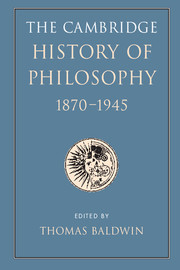Book contents
- Frontmatter
- Contents
- List of contributors
- Introduction
- I 1870–1914
- II 1914–1945
- 8 Logic and philosophy: the analytic programme
- 9 The diversity of philosophy
- 10 Knowledge, language, and the end of metaphysics
- 41 Sensible appearances
- 42 The renaissance of epistemology
- 43 The solipsism debates
- 44 Language
- 45 The end of philosophy as metaphysics
- 11 Philosophy and the exact sciences
- 12 Mind and its place in nature
- 13 Philosophy and social science
- 14 Ethics, religion, and the arts
- 15 Law and politics
- Biobibliographical appendix
- Bibliography
- INDEX
- References
43 - The solipsism debates
from 10 - Knowledge, language, and the end of metaphysics
Published online by Cambridge University Press: 28 March 2008
- Frontmatter
- Contents
- List of contributors
- Introduction
- I 1870–1914
- II 1914–1945
- 8 Logic and philosophy: the analytic programme
- 9 The diversity of philosophy
- 10 Knowledge, language, and the end of metaphysics
- 41 Sensible appearances
- 42 The renaissance of epistemology
- 43 The solipsism debates
- 44 Language
- 45 The end of philosophy as metaphysics
- 11 Philosophy and the exact sciences
- 12 Mind and its place in nature
- 13 Philosophy and social science
- 14 Ethics, religion, and the arts
- 15 Law and politics
- Biobibliographical appendix
- Bibliography
- INDEX
- References
Summary
The term ‘solipsism’ derives from the Latin solus ipse, meaning oneself alone. Broadly speaking a method, or doctrine, or point of view is solipsistic to the extent that it assigns a fundamental, irreducible, and asymmetrical role to subjective phenomena of the kind that are normally indicated by use of the singular form of the first person pronoun. Solipsistic theories, that is, stress what is both unique and irreducible about, say, the ‘I’, me, myself, my ego, my subjectivity, or my experience.
Explanatory reliance on such essentially first-personal phenomena is a necessary condition of adoption of a form of solipsism, but it is not sufficient. The use made by Descartes of the principle ‘Cogito, ergo sum’, for example, requires that the principle be formulated in the first person singular. The Cartesian cogito is not, however, intrinsically or inescapably solipsistic, if only because it fails to imply the necessary asymmetry between what is the case for me, as against what is the case for others. On the contrary, as indeed Descartes himself explicitly points out, the cogito is a principle that anyone at all can apply to himself or herself. Solipsism, I shall take it, requires commitment to a stronger view, namely that there are basic metaphysical and epistemological truths of the form ‘I alone–’, or ‘Only I—’. Ontologically, for example, a solipsist might claim ‘I alone exist’, ‘Only I am conscious’, or, in Wittgenstein’s words, ‘Mine is the first and only world’. Epistemologically, on the other hand, solipsism might take the form of a theory committed to the conclusion that ‘For all it is possible to know, only I exist’, or ‘There can be no justification for denying that I alone am conscious’.
- Type
- Chapter
- Information
- The Cambridge History of Philosophy 1870–1945 , pp. 544 - 553Publisher: Cambridge University PressPrint publication year: 2003



